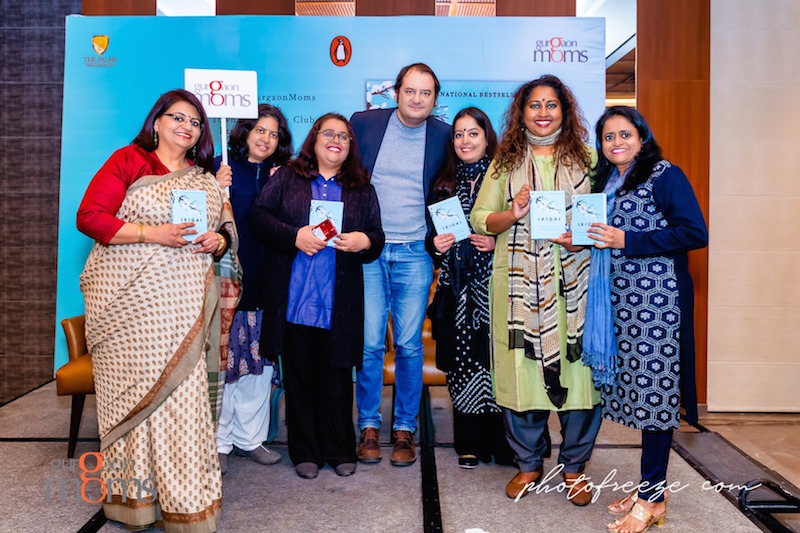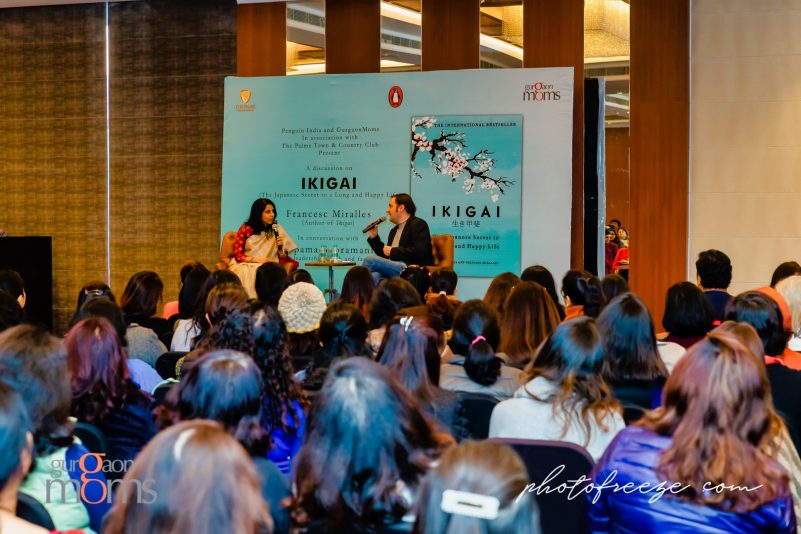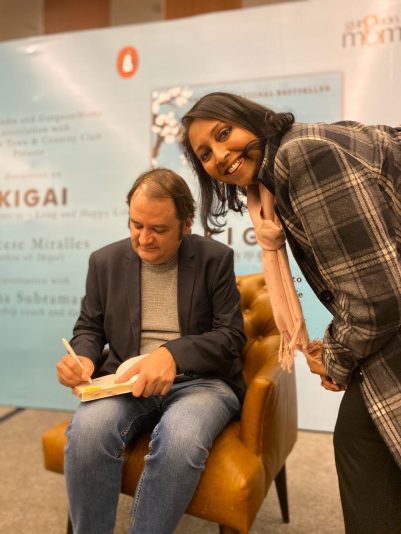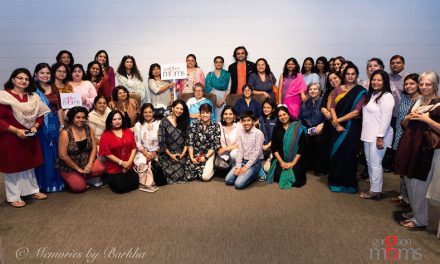Mid-week when my to-do list is mounting, and “to-be” list is taking a back seat; rendezvous with Francesc Miralles, author of Ikigai is like a breath of fresh air.
Easy, breezy, simple, erudite, down-to-earth, a massive power dose of optimism, spouting quotes and thoughts that are music to our ears and balm to our and digitally inundated souls. And what catches my attention is that the dapper, articulate Francesc Miralles also sports a cool pair of patterned socks.
I read Ikigai co-authored by Hector Garcia and Francesc Miralles, in the autumn of 2018. It changed my life forever, in more ways than one. I found my Ikigai as a writer/author way back in 2016, to be eventually swept away into the journey of life.
The last two weeks have been a break neck scramble of sorts. To accomplish things; and speeding with the roller coaster pace of life. Be it deliverables at work and home chores. A piece of writing that’s been sitting in my head waiting to be published. Juggling between weekly yoga classes, cycling and work schedules. Print-outs to be taken and study schedules to be planned for sixth grader’s exams. Calls waiting to be returned. Long over-due visit from our friendly neighbourhood plumber.
Till I hear Francesc begin his conversation with a simple thought,
“If you are in a permanent state of hurry, you won’t have time to think. And you’ll lose things.”
So, how do you find your Ikigai or mission/purpose in life?
Your Ikigai will find you if you pause, take some time off for your self, to reflect and to just be.
Go for that coffee date with “yourself” once a week, unplug from the Wi-fi, reflect and be with yourself.
“Start and end your day without the need to say connected. Be in a state of digital detox three hours before bed-time and two hours after you wake up.”
Infoxication is excessive Information overload, originating from information technology which has inundated our lives, and our unquenchable quest to connected with the world at large.
Maintaining a digital diary for your appointments is the best way to streamline your life.
Children and Ikigai
The musician, traveller, journalist, translator that Fransec Miralles is, reiterates,
“It is normal for children to not know what they want to do. Give them the opportunity to do what they love doing.”
“Remind them that if they commit mistakes, they have more opportunities to grow and learn.”
“Give them the freedom to make decisions. They may fail many times. But life is about hits and misses. So refrain from pressuring them.”
Francesc finished his university studies only at 28. He spent the previous years travelling and looking out for his ikigai or mission.
“Some Ikigai can be forever and some for part of our lives.”
Francesc himself was a German teacher, before he went on to become a translator, musician, journalist. Now his Ikigai is to help people discover their talents and creativity.Our children, he says may have three-four different career paths. For instance, the three top psychologists of Spain were once the Directors of well-known banks.
“Plan for your future, yet don’t write the complete script of your life. Learn to play it by the ear.”
The learned author goes on to tell his audience to plan for their future, yet be fluid. Its good to be flexible to make space for the unexpected.
“Don’t fix your route, flow with life.”
Plan for your year, but make space for fluidity.
“Be the architect of your destiny, instead of being the historian of you life.”
On being asked how to remain resilient through life’s curve balls, the author stresses the importance of moving forward and letting go of the past, to make way for a brighter future.
He believes it is people who have resilience to handle changes and adversity are the ones who can have a great life.
Darwin very nicely sums it up, says Francesc when he says, “The strongest species are not the ones with physical strength, but the ones that adapt to change.
“Imagination and not resignation “
“Its good to dream and imagine the impossible,” says Francesc. Have a strategy in place, break it into different steps and stages, start small, get feedback and then go forward from there.
The best piano players are those who are ready to play simple pieces. That is the Japanese philosophy of Kaizen, an approach to creating continuous improvement based on the idea that small, ongoing positive changes can reap major improvements.
“Dream big, start small and keep going.”
The first two parts of this thought are easy to implement but the difficult part is to “keep going.”
Young people are not so persistent any more. We must help them become so. A Buddhist monk who meditates also practises persistently. Says Francesc with all earnest.
How to make your Ikigai a reality?
“Make your Ikigai your reality by making it the centre of your life.”
– Figure out how many hours a day you need to make it happen.
– Renounce other things.
– Be patient, as there are no quick hacks or quick ways. After all there aren’t any shortcuts in life.
“In your moments of loss, you are ready to raise a new world.”
“We grow when besieged with challenges. We only learn outside our comfort zone.”
Many big discoveries came by accident, informs Fransesc. The famous painter Frida Kahlo started painting in her moment of pain. She had a terrible accident in Mexico and was seriously injured and in bed for months. It is in bed that she began her artistic journey that went on to be written in the annals of history.Steve Jobs went on to revolutionise the world with Apple, only after he lost his first company.
Career breaks for women while raising children are the perfect ground to reinvent and rediscover themselves.
It is in their 80s that some people go back to school, learn a new skill or write a book. After all they have the luxury of time to think and reflect.
“Young people will return to a quieter life. Staying disconnected from information technology will become fashionable again.”
Like it is in the island of Okinawa in Japan or remote villages of Kerela where people live happily, have a sense of purpose, and live long, healthy lives.
Children mirror their parents. They learn from what their parents do, and not what they say. Their addiction to technology is a reflection of what they see their parents do.
Give your children the time to express their feelings, ideas, projects. Share with them, take them to their roots.
The two top things that would help us stay in tune and in touch with our Ikigai
- Stay active doing what you love, and with the people you love. This will benefit you and the world at large. Japanese don’t retire. They believe, “Retirement is the waiting room of death’
One needs time to develop ones Ikigai. You can find your Ikigai and reinvent yourself even at 70
- Be curious, experiment, explore and discover. Try different things, to find that which is your Ikigai. Some Ikigai is forever and some for a part of our lives.
I returned home that evening with a heart as light as a wispy cloud, armed with precious Knowledge to live my life better, while staying true to myself, my Ikigai, with my loved ones and the world at large.
Francesc Miralles the award-winning and bestselling author of books on how to live life well, has also written Love in Small Letters and Wabi-Sabi. He spent time in Okinawa, Japan with his co-author and friend, Hector Garcia studying the inhabitants of Okinawa and their secret for a long, healthy, happy life.








Hi Natasha, that was a great post! I have just started reading the book a few days back and can already feel the difference. Also, I am a fan of your work. Keep writing more and inspiring us.
Thanks a bunch Sophie. I’m so glad you started reading the book and my writing resonates.
I always say it’s the universe that guides the hand that writes.
Good luck to you finding your Ikigai. 🙂